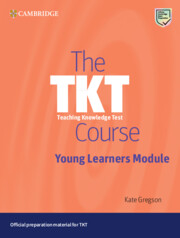Book contents
- Frontmatter
- Acknowledgements
- Contents
- Introduction
- Part 1 Knowledge of young learners and principles of teaching English to young learners
- Part 2 Planning and preparing young learner lessons
- Part 3 Teaching young learners
- Part 4 Assessing young learner learning in the classroom
- Follow-up activities: Answer keys and commentaries
- List of terms found in the TKT Glossary
- Glossary of TKT: Young Learners terms
- Test tips for TKT: Young Learners
- Teaching knowledge test young learners: Practice test
- Sample test answer sheet for TKT: YL practice test
- Answer key for TKT: YL practice test
Unit 2 - Developing children’s learning strategies: How can I help children develop their learning strategies through language learning?
Published online by Cambridge University Press: 14 March 2024
- Frontmatter
- Acknowledgements
- Contents
- Introduction
- Part 1 Knowledge of young learners and principles of teaching English to young learners
- Part 2 Planning and preparing young learner lessons
- Part 3 Teaching young learners
- Part 4 Assessing young learner learning in the classroom
- Follow-up activities: Answer keys and commentaries
- List of terms found in the TKT Glossary
- Glossary of TKT: Young Learners terms
- Test tips for TKT: Young Learners
- Teaching knowledge test young learners: Practice test
- Sample test answer sheet for TKT: YL practice test
- Answer key for TKT: YL practice test
Summary
LEARNING OUTCOMES
By the end of this unit, you will…
KNOWLEDGE: know more about the benefits of learning strategies to children's language learning
SKILLS: be able to identify a range of learning strategies and ways of helping children to develop them through language learning
■ Starter Question
Before you begin this unit, read the starter question and make some notes. Then read the commentary and compare it to your notes.
Why do you think it is useful to help children develop strategies which help them learn? Note two or three reasons.
COMMENTARY
Learning strategies are techniques children use to help them learn, and in this case, learn English specifically. They may use some techniques consciously, and some unconsciously. Learning strategies are useful to children because they help them to become more autonomous, independent learners as they develop greater understanding of what learning is and, therefore, how to learn without as much help from the teacher. Through this, they improve their ability to learn. Children can also apply many learning strategies they use for English to other subjects in the curriculum; they may already use learning strategies to help them learn in other subjects which they can transfer to learning English. Teachers can teach children learning strategies explicitly, and can ask them to practise them at home and in class. They can also highlight the connections between English and other subjects in the curriculum, which will further motivate children in their learning of English. Teachers will benefit from having more confident and efficient learners in class, and they will be able to see how different children in their classes learn best. From here, the teacher can plan and manage learning better for the specific groups of children they teach.
Key concepts
Reflect on the key concept question. Brainstorm your ideas, then expand your notes as you read.
What can we focus children's attention on to help them become better learners? Give one or two examples.
COMMENTARY
Learning is an active process, undertaken by the learner, and we can help children become better language learners and learners in life in general by helping them become more expert in the skills needed for the learning process
- Type
- Chapter
- Information
- The TKT Course Young Learners Module , pp. 16 - 24Publisher: Cambridge University PressPrint publication year: 2024

